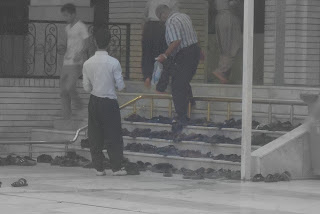Background:
-2.5 million refugees and internally displaced persons in the region of Iraqi Kurdistan; some have basic needs cared for, others do not.
-CPTers from foreign lands receive a 15 day visa on entry to the region, then they must visit the residency office to request a year visa.
-our team mate Mohammed is our sponsor. He must go with us to this office.
Last Thursday morning I made my last trip to the residency office. I needed a 25 day extension to my year visa to allow me to stay until 17 March when my last plane flies out of Iraqi Kurdistan.
I really don't like the residency office. The rules change every few months and there is the feeling that anyone can, at any minute, question the legitimacy of our query. This time there was a new office to enter and a new signature to obtain. Mohamed and I sat on the black plastic couches awaiting our turn to speak to the official.
As we waited for his answer an older woman with a head-covering entered and sat down. She did not have papers or a passport. The official gestured to her to speak. I could tell that her language was Arabic, so the only words I could recognize was Ranya (a small city two hours away) and Kirkuk (the oil-rich disputed city, also two hours away). She told her story with the beginning of tears in her eyes. He listened patiently, said a few words, reached for his wallet and pulled out 15,000 Iraqi Dinars ($13). I really could not believe what I was seeing, but I did have a very warm feeling toward this man.
After we received his signature I asked Mohamed to clarify my observations. The woman had fled the violence in Kirkuk with her family and now lives in Ranya. She asked him if he could organise the ones working at the office to give her some donations because the family had nothing. He told her he could not because his employees rely on government salary which has not been paid in 3 months. However, he had money that he could personally give to her. Thus he handed over the 15,000 ID.
This incident is rich on so many levels. It speaks to the abject poverty of the millions of refugees and IDPs. It tells of the government workers (approximately 75% of the population) who have not been paid in 3-5 months. And it shows that even an official can show compassion. He had the power to call the security guards to throw her out but he did not and gave her so much more than a usual donation to the poor.
Two weeks ago our CPT trainees posted a video. It tells the story of the government workers of Iraqi Kurdistan who have not received their salaries. Some are on strike, waiting for the day that the government finds the funds to pay them. Others are still working, serving the public and also waiting.

















































